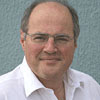 Stating that “Catholics can become fanatical about one form of the Body of Christ in the bread of the Eucharist as the REAL presence of Christ,” Father Michael Kelly, the Jesuit CEO of the Asian Catholic news agency UCA News, criticized the doctrine of transubstantiation in a May 24 column. In his column-- a critique of the new, more accurate liturgical translations that reflect the content and dignity of the original Latin-- Father Kelly writes:
Stating that “Catholics can become fanatical about one form of the Body of Christ in the bread of the Eucharist as the REAL presence of Christ,” Father Michael Kelly, the Jesuit CEO of the Asian Catholic news agency UCA News, criticized the doctrine of transubstantiation in a May 24 column. In his column-- a critique of the new, more accurate liturgical translations that reflect the content and dignity of the original Latin-- Father Kelly writes: Regrettably, all too frequently, the only Presence focused on is Christ’s presence in the elements of bread and wine. Inadequately described as the change of the “substance” (not the “accidents”) of bread and wine into the body and blood of Christ, the mystery of the real presence of Christ in the Eucharist carries the intellectual baggage of a physics no one accepts. Aristotelian physics makes such nice, however implausible and now unintelligible, distinctions. They are meaningless in the post-Newtonian world of quantum physics, which is the scientific context we live in today.
The Council of Trent summarizes the Catholic faith by declaring: "Because Christ our Redeemer said that it was truly his body that he was offering under the species of bread, it has always been the conviction of the Church of God, and this holy Council now declares again, that by the consecration of the bread and wine there takes place a change of the whole substance of the bread into the substance of the body of Christ our Lord and of the whole substance of the wine into the substance of his blood. This change the holy Catholic Church has fittingly and properly called transubstantiation." (no. 1376)
Source(s): these links will take you to other sites, in a new window.
Link (here) to the Catholic Culture piece.










2 comments:
I didn´t realize quantum physicists considered the incarnation of God, let alone transubstantiation; or when they became qualified to determine what was real or possible beyond what is reducible to mathematics; or that everything is reducible to what can be expressed mathematically.
Enrique Alonso
¨We are dealing here with the vast question as to how we can and cannot know God, how we are related to God and how we can lose him. The arrogance that would make God an object and impose our laboratory conditions upon him is incapable of finding him...To think like that is to make oneself God. And to do that is to abase not only God, but the world and oneself too.¨
from Jesus of Nazareth --p. 37
Pope Benediot XVI
Post a Comment